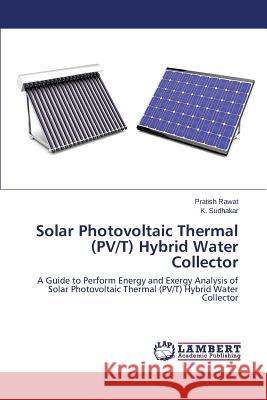Solar Photovoltaic Thermal (PV/T) Hybrid Water Collector » książka
Solar Photovoltaic Thermal (PV/T) Hybrid Water Collector
ISBN-13: 9783659629976 / Angielski / Miękka / 2014 / 76 str.
An extensive amount of research on PV-Thermal collectors has been carried out over the past 25 years. The electrical conversion efficiency of solar cell is in the range of 6-15%, depending on type solar-cell at standard temperature and pressure. When a solar radiation incident on the panel it generate electricity and 75-80% of the absorbed radiation is dissipated in the form of heat to the surrounding after photovoltaic conversion. High solar irradiation increases the electrical conversion efficiency but also increases the temperature of panel. A PV/T hybrid system is a combination of photovoltaic and solar thermal system. The solar PV/T system is an integrated system which can produce both electricity and heat simultaneously. In this work, performance evaluation of PV/T hybrid water collector is evaluated and compared with the solar PV system. The hybrid design gives additional advantages, such as a reduction of the thermal stresses and hence a longer life of the PV module, high performance and reliability, low maintenance and a stabilization of the solar cell current-voltage characteristics. The collected thermal energy can be used for low temperature applications.
An extensive amount of research on PV-Thermal collectors has been carried out over the past 25 years. The electrical conversion efficiency of solar cell is in the range of 6-15%, depending on type solar-cell at standard temperature and pressure. When a solar radiation incident on the panel it generate electricity and 75-80% of the absorbed radiation is dissipated in the form of heat to the surrounding after photovoltaic conversion. High solar irradiation increases the electrical conversion efficiency but also increases the temperature of panel. A PV/T hybrid system is a combination of photovoltaic and solar thermal system. The solar PV/T system is an integrated system which can produce both electricity and heat simultaneously. In this work, performance evaluation of PV/T hybrid water collector is evaluated and compared with the solar PV system. The hybrid design gives additional advantages, such as a reduction of the thermal stresses and hence a longer life of the PV module, high performance and reliability, low maintenance and a stabilization of the solar cell current-voltage characteristics. The collected thermal energy can be used for low temperature applications.











